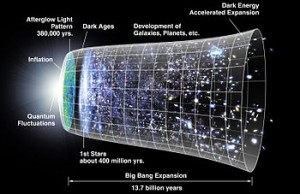In 1931, Monseigneur Georges Lemaître proposed in his hypothèse de l’atome primitif (hypothesis of the primeval atom) that the universe began with the ‘explosion’ of the ‘primeval atom’. It was Fred Hoyle, one of the architects of the steady state theory, who coined the name of Lemaître’s theory, referring to it as ‘this big bang idea’ in a radio interview in March 1949.
Many of our greatest scientific minds now believe that all matter, energy and space in the universe was once squeezed into an infinitesimally small volume, which erupted in a cataclysmic ‘explosion’ that has become known as the Big Bang, see my blog of Oct 27th 2014.
Obviously, the concept of the Big Bang, whether correct or otherwise, cannot possibly have any effect on the primeval event (whatever it may have been) or the subsequent evolution of the universe. Therefore it is reasonable to ask; how can the concept of the Big Bang, whether correct or otherwise, have any influence on human consciousness?
The concept of the Big Bang is based on the mindset that the universe is purely a physical phenomenon. This view is understandable, since the language of physics is mathematics, and mathematics can only describe the physical – it must have something (some ‘thing’) to describe – a particle, a wave, a vibration etc. Mathematics, therefore, cannot describe the non-physical (pre-particle) state, and consequently it is understandable that scientists are reluctant to enter that area. Einstein once said: “So far as the theories of mathematics are about reality, they are not certain; so far as they are certain, they are not about reality.”
But what if there is a non-physical aspect to the universe? In 1998 scientists discovered that the universe is expanding at an accelerating rate and the only way they can explain that reality is by suggesting the existence of ‘stuff’ they call dark energy, which they estimate makes up approximately 70 per cent of reality. In my book, Dark Energy and Human Consciousness, I present logical arguments which suggest that dark energy is a non-physical (pre-particle) phenomenon that not only influences the universe but also life, mind, and human consciousness.
However, the fact that the Big Bang theory is the accepted scientific model regarding the origin of the universe, it has a significant influence on the scientific understanding of life, which is as follows:
- Life emerged from non-life about 3.7 billion years ago
- Life evolved, and continues to evolve, based on mutation, natural selection, and time
- All mutations are by chance.
This essentially means that scientists regard life as a purely physical phenomenon – surprise, surprise!!
If life is purely physical, then the natural propensity of matter is crucial to the evolution of life, mind, and human consciousness; and it is human consciousness that dictates the way we act and behave, both individually and collectively.
Matter has a natural propensity to evolve toward lower complexity, as the second law of thermodynamics and the concept of entropy explain. Now consider human consciousness in terms of complexity. The lowest level of complexity is to offer care and compassion to the ‘self’ only. Examples of increasing levels of complexity are to offer care and compassion to family, community, society, country, and eventually to all humanity; in other words, lower complexity equals lower inclusion and higher complexity equals higher inclusion – as the collective is a higher level of complexity than the individual. Based on this principle, it’s reasonable to suggest that, if human beings are purely physical, then their natural tendency is to care for themselves rather than the collective. This explains why selfishness is a natural trait that is innate in every human being.
Therefore the only way we can overcome selfishness is to acknowledge and nurture the non-physical (dark energy) aspect of life which has a natural propensity to expand and go to higher complexity – and therefore greater enlightenment. Overcoming the natural trait of selfishness empowers us to evolve past the culture of selfishness, corruption, abuse of power, and greed that dominates in all our political, public service, financial, and religious institutions worldwide. Only then can we address the worldwide problems of poverty, starvation, conflict, and war.
In order to take the first step on that journey, science must acknowledge that the universe and life have a non-physical aspect – this will empower humanity to acknowledge and nurture the non-physical aspect of life.
However, to take that first step, scientists will have to reconsider the Big Bang theory.
Recent Posts
- Scientific Support for Brexit July 5, 2018
- The Evolution of Human Consciousness November 12, 2015
- Will Science Retreat into a Cul de Sac – just as Theology did before them? September 22, 2015
- Corruption and Abuse of Power are the Source of all the Major Problems in our World September 9, 2015
- A United Europe. Is it a crazy idea? – or – Is it a necessary step in the evolutionary journey of the human race? August 11, 2015
- A New Scientific View of Reality based on The Grand Interactive Model June 9, 2015
- Humanity can create a world dominated by Love, Care, and Compassion April 13, 2015
- The Origin and Evolution of the Universe – The Grand Interactive Model November 28, 2014
- The roles science and theology have played in creating our present world of pain and suffering November 25, 2014
- Science and Theology – A Common Understanding November 18, 2014
Archives
- July 2018 (1)
- November 2015 (1)
- September 2015 (2)
- August 2015 (1)
- June 2015 (1)
- April 2015 (1)
- November 2014 (6)
- October 2014 (6)
- July 2014 (1)




Recent Comments